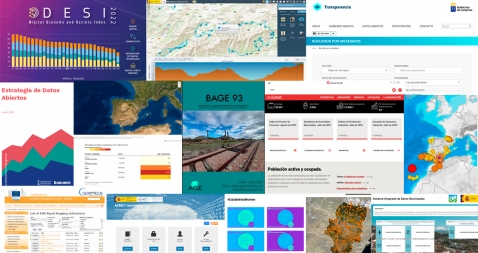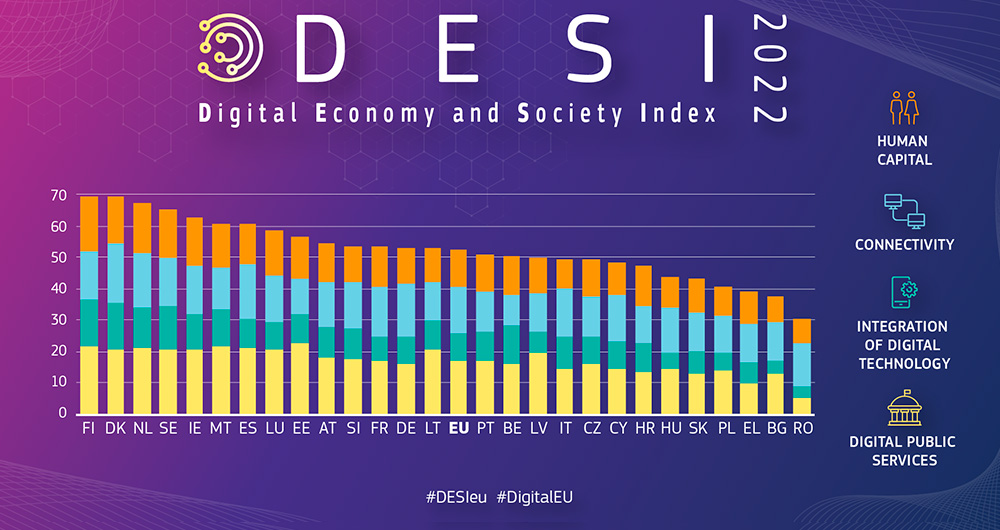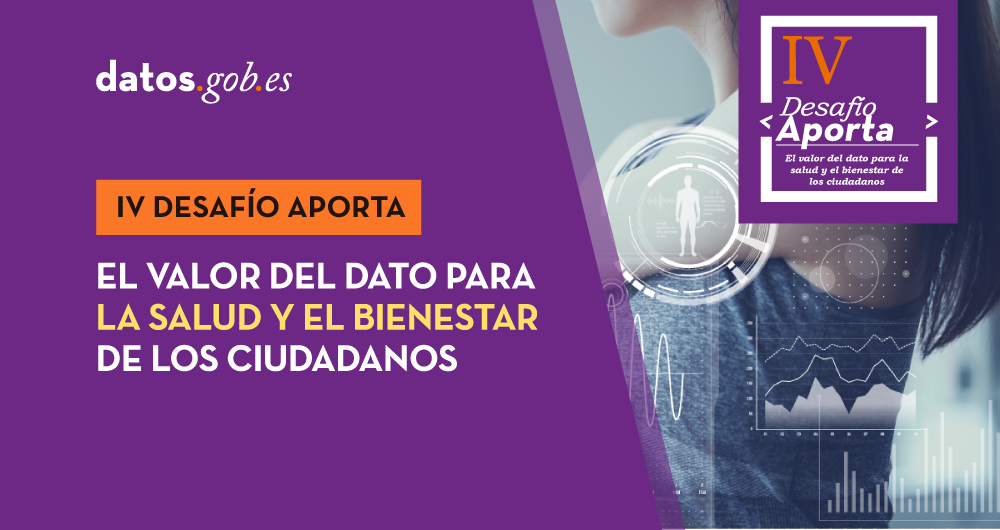Open data ecosystem developments (summer 2022)
Fecha de la noticia: 15-09-2022

There are only a few days left until the end of summer and, as with every change of season, it is time to review what the last three months have brought in the Spanish open data ecosystem.
In July we learned of the latest edition of the European Commission's DESI (Digital Economy and Society Index) report, which places Spain ahead of the EU average in digital matters. Our country is in seventh position, improving two places compared to 2021. One of the areas where it performs best is in open data, where it ranks third. These good data are the result of the fact that an increasing number of organisations are committed to opening up the information they hold and more reusers are taking advantage of this data to create valuable products and services, as we will see below.
Advances in strategy and agreements to promote open data
Open data is gaining ground in political strategies at national, regional and local level.
In this regard, in July the Council of Ministers approved the draft Act on the Digital Efficiency of the Public Justice Service, an initiative that seeks to build a more accessible Justice Administration, promoting the data orientation of its systems. Among other issues, this act incorporates the concept of "open data" in the Administration of Justice.
Another example, this time at the regional level, comes from the Generalitat de Valencia, which launched a new Open Data Strategy at the beginning of the summer with the aim of offering quality public information, by design and by default.
We have also witnessed the signing of collaboration agreements to boost the open data ecosystem, for example:
- The Ajuntament de L'Hospitalet and the Universitat Politècnica de Catalunya have signed an agreement to offer training to undergraduate and master's degree students in Big Data and Artificial Intelligence, based on open data work.
- The University of Castilla la Mancha has agreed with the regional government to launch the 'Open Government' chair in order to promote higher education and research in areas such as transparency, open data or access to public information.
- The National Centre for Geographic Information (CNIG) and Asedie have signed a new protocol to improve access to geographic information, in order to promote openness, access and reuse of public sector information.
Examples of data reuse
The summer of 2022 will be remembered for the heat waves and fires that have ravaged different corners of the country. A context in which open data has demonstrated its power to provide information on the state of the situation and help in extinguishing fires. Data from Copernicus or the State Meteorological Agency (AEMET) have been used to monitor the situation and make decisions. These data sources, together with others, are also being used to understand the consequences of low rainfall and high temperatures on European reservoirs. In addition, these data have been used by the media to provide the public with the latest information on the evolution of the fires.
Firefighting based on open data has also been developed at the regional level. For example, the Government of Navarre has launched Agronic, a tool that works with Spatial Data Infrastructures of Navarre to prevent fires caused by harvesters. For its part, the Barcelona Provincial Council's open data portal has published datasets with "essential information" for the prevention of forest fires. These include the network of water points, low combustibility strips and forest management actions, used by public bodies to draw up plans to deal with fire.
Other examples of the use of open data that we have seen during this period are:
- The Environmental Radiological Surveillance Network of the Generalitat de Catalunya has developed, from open data, a system to monitor the radiation present in the environment of the nuclear power plants (Vandellòs and Ascó) and the rest of the Catalan territory.
- Thanks to the open data shared by Aragón Open Data, a new scientific article on Covid-19 has been written with the aim of finding out and identifying spatio-temporal patterns in relation to the incidence of the virus and the organisation of health resources.
- The Barcelona Open Data initiative has launched #DataBretxaWomen, a project that seeks to raise public awareness of the existing inequality between men and women in different sectors.
- Maldito dato has used open data from the statistics developed by the National Statistics Institute (INE) based on mobile positioning data to show how the population density of different Spanish municipalities changes during July and August.
- Within its Data Analytics for Research and Innovation in Health Programme, Catalonia has prioritised 8 proposals for research based on data analysis. These include studies on migraines, psychosis and heart disease.
Developments in open data platforms
Summer has also been the time chosen by different organisations to launch or update their open data platforms. Examples include:
- The Statistical Institute of Navarre launched a new web portal, with more dynamic and attractive visualisations. In the process of creation, they have managed to automate statistical production and integrate all the data in a single environment.
- Zaragoza City Council has also just published a new open data portal that offers all municipal information in a clearer and more concise way. This new portal has been agreed with other city councils as part of the 'Open Cities' project.
- Another city that already has an open data portal is Cadiz. Its City Council has launched a platform that will allow the people of Cadiz to know, access, reuse and redistribute the open data present in the city.
- The Valencian Institute of Business Competitiveness (IVACE) presented an open data portal with all the records of energy certification of buildings in the Valencian Community since 2011. This will allow, among other actions, to carry out consumption analysis and establish rehabilitation strategies.
- Aragón Open Data has included a new functionality in its API that allows users to obtain geographic data in GeoJSON format.
- The National Geographic Institute announced a new version of the earthquake app, with new features, educational content and information.
- The Ministry for Ecological Transition and the Demographic Challenge presented SIDAMUN, a platform that facilitates access to territorial statistical information based on municipal data.
- The open data portal of the Government of the Canary Islands launched a new search engine that makes it possible to locate the pages of the portal using metadata, and which allows exporting in CVS, ODS or PDF.
Some organisations have taken advantage of the summer to announce new developments that will see the light of day in the coming months, such as the Xunta de Galicia, which is making progress in the development of a Public Health Observatory through an open data platform, Burgos City Council, which will launch an open data portal, and the Pontevedra Provincial Council, which will soon launch a real-time budget viewer.
Actions to promote open data
In June we met the finalists of the IV Aporta Challenge: "The value of data for the health and well-being of citizens", the final of which will be held in October. In addition, some competitions have been launched in recent months to promote the reuse of open data, for which the registration period is still open, such as the Castilla y León competition or the first UniversiData Datathon. The Euskadi open data competition was also launched and is currently in the evaluation phase.
With regard to events, the summer started with the celebration of the Open Government Week, which brought together various activities, some of them focused on data. If you missed it, some organisations have made materials available to citizens. For example, you can watch the video of the colloquium "Open data with a gender perspective: yes or yes" promoted by the Government of the Canary Islands or access the webinar presentations to learn about the Data Office and the Aporta Initiative.
Other events that have been held with the participation of the Data Office and whose videos are public are: the National Congress on Archives and Electronic Documents and the Data Spaces as ecosystems for entities to reach further.
Finally, in the field of training, some examples of courses that have been launched these months are:
- The National Geographic Institute has launched an Inter-administrative Training Plan, with the aim of generating a common culture among all the experts in Geographic Information of the public bodies.
- Andalucía Vuela has launched a series of free training courses aimed at citizens interested in data or artificial intelligence.
International News
The summer has also brought many new developments at the international level. Some examples are:
- The beginning of the meteorological summer saw the publication of the results of the first edition of the Global Data Barometer, which measures the state of data with respect to societal issues such as Covid19 or climate.
- The 12 finalists of the Eu Datathon 2022 were also announced.
- An interactive edition of Eurostat's regional yearbook 2021 was published.
- England has developed a strategy to harness the potential of data in health and healthcare in a secure, reliable and transparent way.
This is just a selection of news among all the developments in the open data ecosystem over the last three months. If you would like to make a contribution, feel free to leave us a message in the comments or write to dinamizacion@datos.gob.es.














